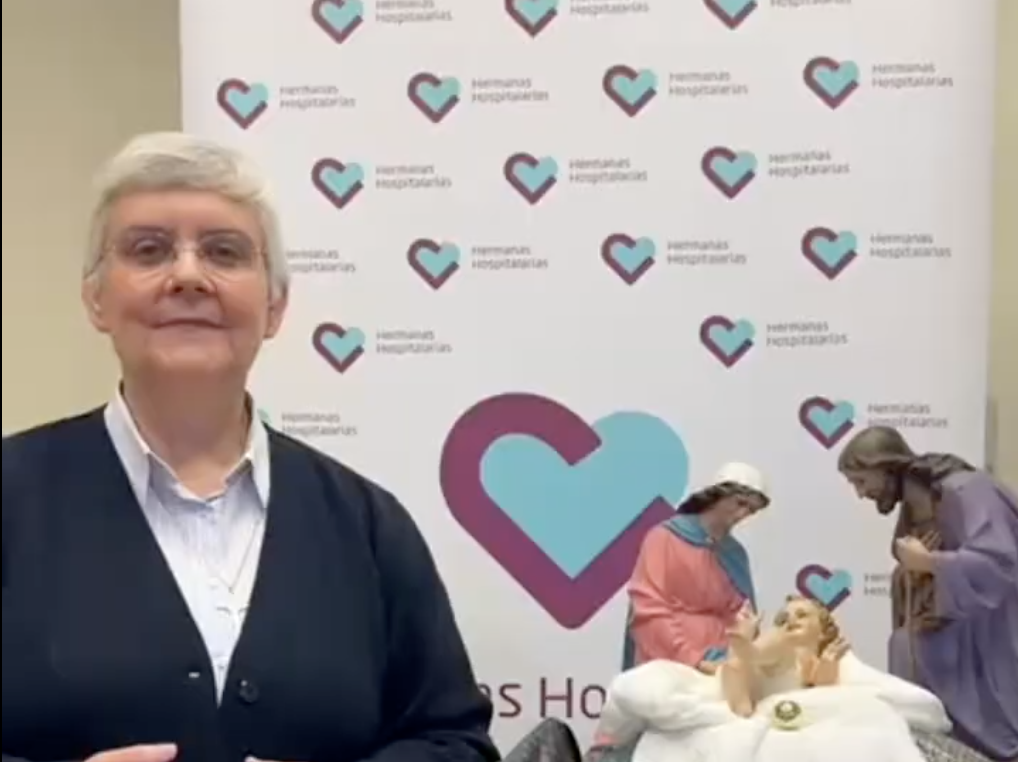Did you know that in Cochabamba, Hermanas Hospitalarias cares for children with disabilities with the early stimulation model?
We share with you the testimony of Mirtha Jiménez Ledezma, SIMAJ Technical Coordinator, Cochabamba. She will share with us how they work in the center, the benefits of early stimulation and much more.
What have you found at Hermanas Hospitalarias en Servicios Integrados María Josefa Recio (SIMAJ)?
As a collaborator of the Congregation of the Sisters Hospitallers of the Sacred Heart of Jesus, I experience a deep connection and communion with the Hospitaller Charism, since from the profession I perform as a clinical psychologist, I find the link of connection with the mission of healing and healing of the human being, today specifically with children with disabilities, to whom with the interventions that we carry out together with the team of professionals, we restore their abilities and accompany them to acquire new skills for daily life. In this sense, the Congregation is my “Hospitaller spiritual family”, where I share a joint mission, service and commitment to the sick.
What are your functions in the coordination of SIMAJ?
The role of Coordination in the Center for Children with Disabilities is essential to ensure the quality of services and comprehensive care of our children, then I will present seven key functions I played in the hospital mission, in this context:
1. Planning and Organization: Within the coordination functions is to develop strategic plans for the center, taking into account the specific needs of children with disabilities. Moreover, coordinate and organize events, programs and activities that promote the welfare and development of children.
2. Resource Management: It is important to ensure that adequate and trained staff is available to meet the needs of children with disabilities, as well as to supervise and efficiently manage the human and material resources of the Center.
3. Interdisciplinary Collaboration: Facilitate communication and collaboration between professionals from different disciplines: physiotherapy, educators and psychology, to ensure a comprehensive approach in the care of children.
4. Evaluation and Follow-up: Evaluation systems are implemented to measure the progress of each child and adjust intervention plans as needed, as well as regular follow-ups to evaluate the effectiveness of the intervention programs and services offered.
5. Family Liaison: Another important function is to establish effective and affective communication with the children’s parents and/or guardians to understand their needs and expectations. Likewise, to provide support to families, providing information, guidance and pedagogical resources to improve the quality of life of children in the family environment.
6. Regulatory Compliance: Ensure that the Center complies with local rules and regulations related to the care of children with disabilities, and maintain updated records and prepare reports to demonstrate compliance with established standards.
7. Training and Professional Development: It is important to facilitate training and professional development workshops for the Center’s collaborators, ensuring that they are updated on best practices and pedagogical approaches, while fostering an environment of continuous learning and constant improvement within the team, with communication and close, hospitable and humanizing interpersonal relationships being relevant.
In this sense, these coordination functions are fundamental to ensure that the Center provides a quality service based on the hospital charisma and promotes the integral development of children with disabilities, taking into account their individual needs.
How does SIMAJ work with children with disabilities?
Our Hospital Institution works through Early Stimulation, adapting the pedagogical methodology of Maria Tecla Artemisia Montessori, which is a set of practices designed to promote the integral development of children in their first years of life. When it comes to children with disabilities, this intervention takes on even greater importance, as it seeks to maximize potential and provide the necessary tools to face the challenges that may arise throughout the child’s life. In this article, I will mention the importance of early stimulation for children with disabilities, the benefits it can bring and some practical strategies to implement on a daily basis.
What is the importance of early stimulation for children with disabilities?
Disability in childhood can include several areas, such as motor skills, communication, language, cognition, etc. In this sense, early stimulation becomes an essential pillar for these children, as it contributes to the development of specific skills adapted to their individual needs. In addition, it encourages family participation in the intervention process, strengthening emotional bonds and creating a favorable environment for the child’s development.
What are the benefits of early stimulation for children?
The benefits can be described in four areas:
- Cognitive Development: early stimulation contributes to the development of cognitive skills, promoting reasoning, attention and problem-solving. In children with disabilities, this can make a difference by facilitating the learning of adaptive strategies.
- Motor Development: Adapted to the specific needs of each child, early stimulation can improve fine and gross motor skills, allowing greater independence in daily activities.
- Social-Affective Development: Promotes social and emotional interactions, improving the child’s self-esteem and self-image. The establishment of solid affective relationships is also crucial for emotional development.
- Communication and Language: Early stimulation facilitates the development of language and communication, adapting to the individual characteristics of each child. It can include the use of alternative communication systems for those with speech difficulties.
What are the practical strategies for implementing early stimulation?
In order to carry out an adequate process of early stimulation in children with disabilities we focus on:
- Individualization of the Plan: Each child with a disability is unique, therefore, it is essential to adapt early stimulation strategies to the specific characteristics and needs of each child.
- Family Involvement: Family participation in the early stimulation process is crucial. Parents and caregivers are informed and trained to carry out stimulating activities at home on a daily basis, according to the plan.
- Use of Specific Materials: Using materials adapted to the child’s abilities and limitations can make early stimulation more effective. Toys and tools designed to address particular needs are helpful.
- Interdisciplinary Collaboration: Working hand in hand with other professionals, such as psychologists, kindergarten educators and physiotherapists, enriches the early stimulation approach, ensuring comprehensive and coordinated care.
In your experience with children with disabilities, what would you highlight about early stimulation?
Early stimulation for children with disabilities is an essential component for comprehensive development. By focusing on the child’s abilities and adapting strategies to their individual needs, we can provide them with the necessary tools to reach their full potential, such as promoting a participatory life in the social environment. Likewise, teamwork and collaboration between professionals and families is key to building an environment that supports the growth and well-being of these exceptional children.
In this perspective, having an adapted and collaborative Integrated Hospital Approach can make a significant difference in the development of fundamental skills. Likewise, the dedication, closeness, affection and patience of hospital partners and families play a crucial role in the children’s progress and overall well-being.
“With a charismatic, humanized and personalized integral Hospital Approach, Early Stimulation becomes a beacon of hope to build a brighter future for our children”.



